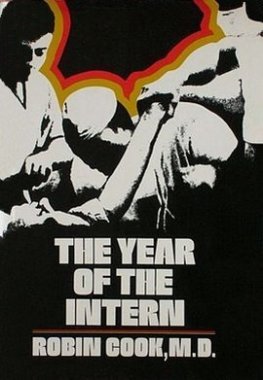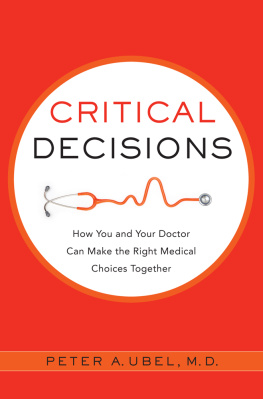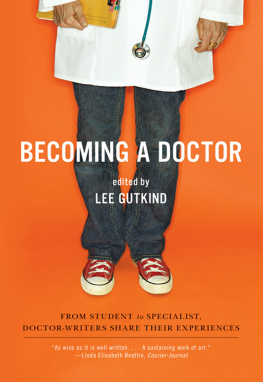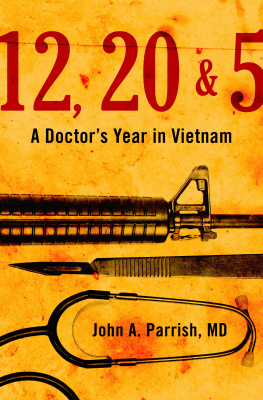Robin Cook
Year of the Intern
This book is dedicated to the ideal of medicine we all held the year we entered medical school.
This book was written under the Pacific Ocean, while the author was on Polaris submarine patrol in the U.S.S. Kamehameha, and it could not have been written without the kindness and understanding of the Kamehamehas commanding officer, Commander James Sagerholm. To him I acknowledge a debt of thanks.
Thanks, also, to Craig Van Dyke, M.D., a psychiatrist in the making, who practiced before he started and thereby sustained the author through many a dark night of doubt and revision.
Americans cling to their myths. Nowhere is this more evident than in the emotion-charged realm of medicine and medical care. People believe what they want to believe, what they have always believed, and either ignore or dismiss as false anything that threatens their comforting confidence in their own doctors or the kind of medical treatment they may be receiving.
Only recently, and with reluctance, has the public at large begun to stir out of its smug assumption that medical personnel and care in the United States are the best in the world. And even this unwelcome awakening has been accomplished more by economics than by reason, more by the rising costs for medical care than by the quality of that care. Although Mrs. Brown may concede that a few things are wrong, nevertheless she clings firmly to the belief that her own dear doctor down the street is the best doctor in town such a wonderful man! And all those young interns, bless their souls so dedicated and wholesome!
The basis for this adoration of the medical world lies deep in the psyche of the modern American. His romance with medicine is demonstrated daily by the hours he spends transfixed in front of the television set watching the diagnostic and therapeutic triumphs of omniscient physicians.
Such romanticism, with its directed credibility and, hence, its tolerance so narrow, makes the presentation of contradictory ideas extremely difficult. Nevertheless, that is the goal of the present book to strip the contemporary mythology and mystique from the year of internship and to convey it in all its hard reality. The psychological effects of internship on the doctor are profound. (That being so, imagine the effects on an endless parade of patients!)
I fervently ask the reader to set forth with an open mind, putting aside that almost irresistible urge to glorify medicine and the people involved in it, and to try to understand the actual effects of an internship an a real person. The people involved in medicine are real people, beset by a complete array of hang-ups anger, anxiety, hostility, egocentrism. When placed in an adverse environment, they respond like people, lot superhuman healers. And, television dramas notwithstanding, internship as it exists today is an adverse environment. (The lack of sleep alone is sufficient to explain a host of aberrant behavior patents; recent studies have shown that an individual will quickly become schizophrenic if deprived of enough sleep.)
All the events described here are real. They constitute typical not unusual days in the life of an intern. Dr. Peters himself represents a synthesis of my own experiences and those of my intern colleagues. He is therefore a composite of several real people. While he does not display the aberrations of a particular psychosocial personality, he nonetheless stands for every intern to a greater or lesser degree. That he emerges as an often whining and complaining individual who fails socially as he develops professionally should not be surprising. True, during his internship Dr. Peters gains greatly in medical knowledge and experience; he also develops a more objective attitude toward death. At the same time, however, there is a concomitant intensity in his repressed anger and hostility that leads toward greater isolation, more autistic behavior, stronger feelings of self-pity, and an inability to establish significant interpersonal relationships.
Other aspects of medical practice as presented here will also grate upon accepted beliefs. Again the reader is implored to keep an open mind, to remember that much of the impersonality and anonymity directed toward patients is simply the inevitable result of familiarity with human illness.
Such impersonality can, of course, be taken to extremes where the patient ceases altogether to be an individual and becomes merely an object to be treated. This is definitely pathological. The potential of reaching this pathological state does exist for an intern. In fact, the potential is virtually forced on him, to cope with usually without guidance as his nature dictates.
One word to anticipate a specific criticism: since Dr. Peters interned in a community teaching hospital, rather than in a university medical center, some will object that any conclusions may apply only to that environment. Perhaps such a comment has a certain merit, but I do not believe it reduces the validity of my central argument. On the contrary, Peterss experiences might well have been intensified if set within a university center. The competition there among interns the game of keeping ahead of the next guy is almost always more severe, and, in such a context, chart work and searches of the medical literature are likely to receive more concern than the patient in the daily value system. I believe that Dr. Peterss experiences apply essentially to both the university and the community teaching programs. What happened to him is substantiated by a convincing similarity of incidents related to me by a number of doctors from each type of internship.
The hospital environment that is not represented here is the nonteaching, nonuniversity hospital. It is possible the criticism does apply to internships in such institutions.
The manuscript of this book was read by eight doctors, none more than three years past his internship. All but one agreed that the content is authentic, bluntly realistic, and completely representative of his own situation. The dissident stated that the attending physicians in the hospital at which he interned had been more readily available for teaching, more sensitive to his needs, than they are depicted here. This doctor had interned at a West Coast university medical center. Perhaps the lesson to be drawn from this is that all medical novices should intern where he did.
I repeat that this book is true. If it does not represent all internships in all hospitals, it represents most in many. It reflects honestly a pervasive condition, disheartening at the least and dangerous at the worst. That is sufficient reason for The Year of the Intern.
I was already out stone-cold when the telephone rang again, half an hour later. J got it on the end of the first ring, reaching instinctively, almost in a panic, as the surgery book that had put me to sleep crashed off the bed onto the floor. God, what now? The nurse was desperate: Dr. Peters, the patient you saw earlier has stopped breathing and he doesnt have any pulse.
Im on my way.
Fumbling down the phone, I went into my routine: pants, shirt, shoes, a dash down the hall to the elevator as I zipped my fly. I pushed the button and heard the high-pitched whine of the electric motor. Waiting impatiently, I suddenly realized I didnt know which patient she meant. There were so many. Mental pictures of those I had seen that night raced through my head. Mrs. Takura, Roso, Sperry, the new one, an old man with stomach cancer. It must be he. He was a private patient, and the first time I had seen him was when Id been called away from dealing with the new admissions because he had developed a sudden severe abdominal pain. He had turned out to be emaciated and so weak he couldnt move, could hardly answer questions...









